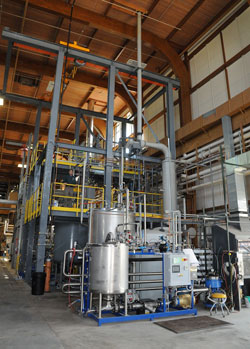
Scientists are working with local government officials and timber processors on a project that could help turn small-diameter trees into high-tech products. The key ingredient is microscopic particles of cellulose, called “nanocellulose.” Scientists have found that nanocellulose materials have unique properties and may be useful in a variety of applications.
Nanocellulose is part of the emerging field of nanotechnology. Nanocellulose materials are strong, lightweight, colorless, and biodegradable. Possible uses may include lightweight armor, ballistic glass, car body panels, computer cases, food storage, and flexible electronics. Other products, such as concrete and structural panels, can be strengthened with the addition of nanocellulose.
The Yreka Cellulose Nanomaterials Project began in 2014, when the Siskiyou County Board of Supervisors met with Forest Service officials. From that meeting came a proposal to evaluate the possible construction of a commercial-scale cellulose nanomaterials production facility in Yreka, California. Yreka was identified as a promising location due to the plentiful supply of wood and the support from local government.
On March 29 local officials received an update on the project from Dr. Alan Rudie, a chemist with the USDA Forest Products Laboratory in Madison, Wisconsin.
Dr. Rudie explained two different focuses of their research. One part of their work is to help develop commercial uses for cellulose nanomaterials. To that end, they have built a pilot facility at the Forest Products Lab in Madison, Wisconsin. The pre-prototype facility produces both cellulose nano-crystals and cellulose nano-fibrils, and shares or sells them at cost to industry and research partners. The Forest Products Company mill in Yreka has supplied wood to the nanocellulose facility in Madison.
The other focus is on preliminary designs for a cellulose nanomaterial production facility in Yreka. Industry and university cooperators are studying six different methods of isolating cellulose nanomaterial. Dr. Rudie and his partners expect that in 2016 they will identify one or two designs to further explore. Actually building a facility would require a more detailed design and an industry investor.
Dan Blessing, Natural Resources Officer for the Klamath National Forest, is the local Forest Service contact for the Yreka Cellulose Nanomaterials Project. Dan emphasizes how operation of such a facility would benefit natural resource management on the Klamath National Forest.
“To help restore fire-resilient ecosystems here on the Klamath National Forest, we need to reduce forest fuels. We have a market for mid-sized trees when we do thinning or fire salvage. But much of the fuels on the Forest are smaller-diameter trees,” said Blessing. “Removing the smaller diameter trees is expensive and there are limited local facilities that have much use for them. Finding a market for cellulose nanomaterials and encouraging construction of a local facility to produce the materials will create a demand for the smaller diameter trees that will reduce the costs of local fuel reduction, benefiting our public forest and providing local jobs.”
Blessing emphasized that the project is still in the early stages. “While the commercial properties of cellulose nanomaterials are promising, much work remains. We’re hoping at least one industry partner will find the materials valuable enough to warrant construction of a larger facility. By having preliminary design of such a facility complete, maybe we can encourage a partner to build it here in Yreka.”
Also presenting at the March meeting was Michael Goergen, Vice President for Innovation with the U.S. Endowment for Forestry & Communities. One of their projects is the “Public-Private Partnership for Nanotechnology,” referred to as P3Nano. They see promise in the use of wood-based nanomaterial for a wide-range of commercial products, and are assisting with the Yreka project.
Author
Rebecca Wallace
Source
Forest Products Laboratory, press release, 2016-04-13.
Supplier
Klamath National Forest
US Endowment for Forestry & Communities, Inc.
US Forest Products Laboratory (US Forest Service & Research)
US Forest Service
Share
Renewable Carbon News – Daily Newsletter
Subscribe to our daily email newsletter – the world's leading newsletter on renewable materials and chemicals









